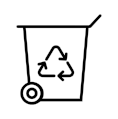We collect food waste every week from houses. We are also introducing food waste recycling to properties with communal recycling areas by 31 March 2026. This is in line with the government’s 'Simpler recycling'.
If you recycle food waste instead of putting it in your rubbish bin, it will get collected every week. It will help reduce smells and leave extra space in your black bin.
Waste in your black bin costs £130 per tonne to treat and dispose of. Food waste brings money back into the council to help cover the cost of collections and save tax-payers' money.

